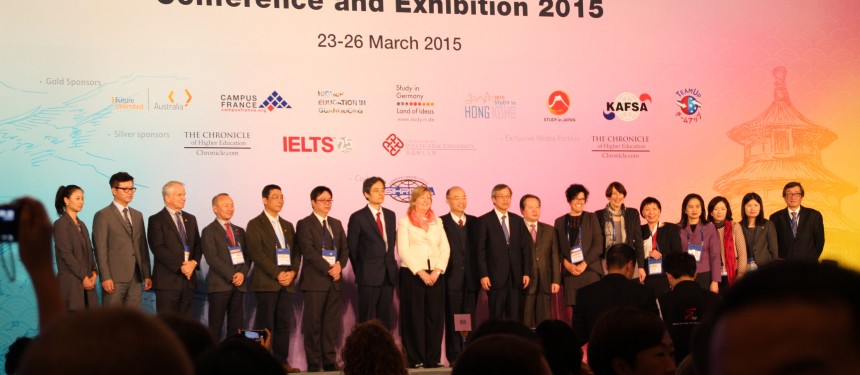With China’s position as the world’s largest economy solidified, the country’s higher education sector is expected to see similar dramatic growth, expanding even further globally, delegates at the Asia-Pacific Association for International Education’s (APAIE) 10th annual conference and exhibition heard.
News and business analysis for Professionals in International Education
Have some pie!
APAIE: China’s HE growth expected to follow economic boom
 The APAIE Board of Directors at the conference's opening ceremony
The APAIE Board of Directors at the conference's opening ceremony The foundations for the event’s discussions in Beijing last week were laid by opening speaker Justin Yifu Lin, former senior vice president and chief economist at the World Bank, who took delegates through the history of China’s economy, and underlined that it has seen an average annual growth rate of 9.7% for 36 years: the highest and longest in human history.
“The economists call this trend the ‘Asianisation of Asia'”
The APAIE conference was hosted this year by Peking University, and a record number of delegates – over 1,600 – from across the world gathered in China’s capital to meet and engage with higher education professionals from the Asia Pacific region and beyond.
“The world is so keen to engage with China and to have China’s most emblematic best university, Peking, deliver this conference, it was bound to attract people from all across the world,” said Susan Elliott, the vice president of APAIE, speaking to The PIE News.
“I’m delighted though. It’s fantastic that there are people from Europe, Africa, North America and South America as well as those within the region.”
According to statistics provided by Project Atlas, in 2013, China was the third leading host destination for international students, boasting an 8% share of the market and falling only behind the UK and the US, who represented 11% and 20% of the number of inbound international students, respectively.
It is also the top sender for international students in many countries including the UK, US, Australia, Canada and Japan.
“I was at Tsinghua [University] yesterday and they were talking about their need to engage even more globally and yet they’re such a globally engaged university,” said Elliott. “I think it’s a progression, but for some countries, a step-change in their internationalisation and their desire to engage with much more international classrooms.”
“The world is so keen to engage with China”
Kazuo Kuroda the dean of international affairs at Waseda University in Japan, observed that China’s economic brawn bodes well for the region as a whole. “The rising economy of Asia is a big factor in the intra-regional mobility in Asia,” he said. “The economists call this trend the ‘Asianisation of Asia’, which is written into international higher education too.”
Still, there is still work to be done as a major concern among Chinese players it that its culture is not as influential as its economy. Programmes are less competitive than European or US counterparts and despite high international enrolments, they still represent less than 1% of the total HE population.
A case study also showed that English taught programmes are less successful in China than other non-anglophone destinations.
Next year’s conference will be held in Australia, a country who’s own outbound scheme– the New Colombo Plan– has made a major impact on China as a study destination, according to Elliot. The 2016 conference will be hosted by nine Victoria universities in Melbourne. “I think what I’d like to talk about in Melbourne is new models for mobility,” she told The PIE News.
“I think research collaboration, particularly through PhD students is another area we could pick up and take forward next year, talking about joint PhDs and the benefits and the challenges that need to be overcome. And I think also Asia Pacific and the rest of the world is a theme that we’d like to pick up on as well.”
Still looking? Find by category:



Chinese experience of economic growth and the role of HE sector in this growth mechanism could be a role model for all developing nations. China could also help these nations as well in developing economic growth models for these respective nations.